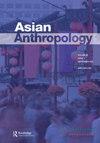Queer and normal: dansō (female-to-male crossdressing) lives and politics in contemporary Tokyo
Q2 Social Sciences
引用次数: 2
Abstract
Abstract Though dansō—female-to-male crossdressing—has been historically embedded in Japan as tradition, performance, and entertainment, in the last fifteen years it has fractured and increasingly become commercialized, adopted by young people—a phenomenon I call “contemporary dansō culture.” One example this article explores are dansō café-and-bars—establishments where employees dress as another gender—which since the mid-2000s have emerged in Nakano, Ikebukuro, and Akihabara, areas in Tokyo where anime, manga, and game fans gather. How do dansō individuals understand their practices and everyday lives? Based on field research, this article explores how dansō individuals’ rejection of LGBT (Lesbian, Gay, Bisexual, Transgender) identity and politics can provide a starting point for rethinking queer theory’s relationship with normativity. Taking a queer anthropological approach, I contend that dansō individuals’ politics simultaneously lies in their turn from “LGBT” and alignment with the “normal,” compelling us to reconfigure queer and norms in the Japanese context.酷儿与正常:当代东京的异装生活与政治
摘要尽管女性对男性的变装在历史上一直作为传统、表演和娱乐植根于日本,但在过去的十五年里,它已经断裂,越来越商业化,被年轻人所采用——我称之为“当代丹斯文化”。“这篇文章探讨的一个例子是dansō咖啡馆和酒吧——员工打扮成另一种性别的场所——自2000年代中期以来,这些场所出现在东京的中野、池袋和秋叶原,动漫、漫画和游戏迷聚集的地区。丹斯人如何理解他们的实践和日常生活?本文在实地研究的基础上,探讨了丹麦人对LGBT(女同性恋、男同性恋、双性恋、变性人)身份和政治的排斥如何为重新思考酷儿理论与规范性的关系提供一个起点。采用酷儿人类学的方法,我认为丹斯人的政治同时在于他们从“LGBT”转向“正常”,迫使我们在日本背景下重新配置酷儿和规范。
本文章由计算机程序翻译,如有差异,请以英文原文为准。
求助全文
约1分钟内获得全文
求助全文
来源期刊

Asian anthropology
Social Sciences-Anthropology
CiteScore
1.60
自引率
0.00%
发文量
25
期刊介绍:
Asian Anthropology seeks to bring interesting and exciting new anthropological research on Asia to a global audience. Until recently, anthropologists writing on a range of Asian topics in English but seeking a global audience have had to depend largely on Western-based journals to publish their works. Given the increasing number of indigenous anthropologists and anthropologists based in Asia, as well as the increasing interest in Asia among anthropologists everywhere, it is important to have an anthropology journal that is refereed on a global basis but that is editorially Asian-based. Asian Anthropology is editorially based in Hong Kong, Taiwan, and Japan, but welcomes contributions from anthropologists and anthropology-related scholars throughout the world with an interest in Asia, especially East Asia as well as Southeast and South Asia. While the language of the journal is English, we also seek original works translated into English, which will facilitate greater participation and scholarly exchange. The journal will provide a forum for anthropologists working on Asia, in the broadest sense of the term "Asia". We seek your general support through submissions, subscriptions, and comments.
 求助内容:
求助内容: 应助结果提醒方式:
应助结果提醒方式:


